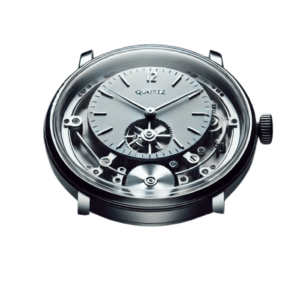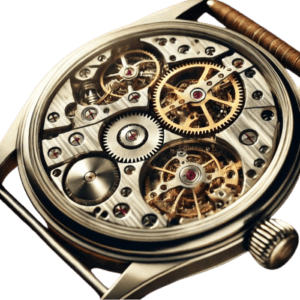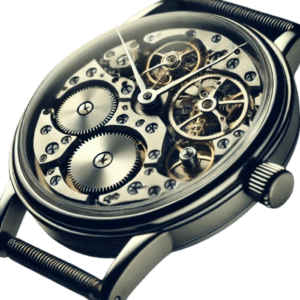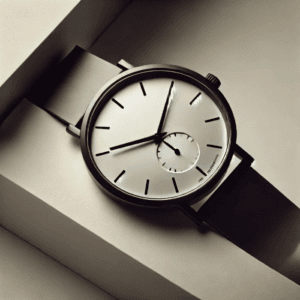
When it comes to choosing between quartz vs mechanical watches, the decision is more than just about keeping time. It’s a choice between modern precision and timeless craftsmanship. Both offer unique advantages, but which is better for you? This guide breaks down the pros and cons of quartz and mechanical watches to help you make an informed decision, based on style, function, and lifestyle.
1. Understanding the Basics: Quartz vs Mechanical Watches
Quartz Watches
Quartz watches are powered by a battery and a quartz crystal, which vibrates at a consistent frequency. This movement is incredibly accurate and requires minimal upkeep, making quartz watches a practical choice for many.
- Battery-Powered: No winding required.
- Highly Accurate: Only deviates a few seconds per month.
- Low Maintenance: Requires a battery change every few years.

Mechanical Watches
Mechanical watches, either manual or automatic, run on a series of gears and springs. While manual watches need to be wound daily, automatic watches wind themselves with wrist movement. These watches are often prized for their intricate design and craftsmanship.
- Manual or Automatic: Powered by winding or wrist movement.
- Craftsmanship: Complex mechanics showcase horological expertise.
- Longevity: With care, mechanical watches can last generations.

2. Precision and Accuracy: Which is Better?
Quartz Watches: Superior Precision
Quartz watches are known for their precision, often deviating just a few seconds per month. For those who value high accuracy and low maintenance, quartz watches are ideal.
- Pros: Reliable and accurate timekeeping.
- Cons: Requires occasional battery replacement.

Mechanical Watches: The Charm of Imperfection
Mechanical watches, while reliable, can deviate by several seconds a day. Factors such as temperature and movement impact their accuracy, but for many, this is part of the watch’s charm.
- Pros: Consistent timekeeping with the option for fine adjustments.
- Cons: Less accurate than quartz and requires regular adjustment.

3. Craftsmanship and Aesthetics: The Beauty of Each
Mechanical Watches: Artistry in Motion
Mechanical watches are admired for their intricate design and the craftsmanship involved. Many come with open case backs, allowing you to see the movement, adding to their visual appeal.
- Pros: Exquisite design, often with visible mechanics.
- Cons: More delicate and complex, requiring careful maintenance.

Quartz Watches: Modern Minimalism
Quartz watches are simpler in design, often slimmer due to the smaller size of the movement. They appeal to those who prefer sleek, modern designs without sacrificing functionality.
- Pros: Slim and lightweight, with various design options.
- Cons: Lacks the mechanical complexity some enthusiasts admire.

4. Maintenance and Durability: What to Expect
Caring for Quartz Watches: Easy Maintenance
Quartz watches are low-maintenance, requiring only occasional battery replacements and minimal servicing.
- Pros: Minimal upkeep, durable for everyday wear.
- Cons: Battery needs to be replaced periodically.
Caring for Mechanical Watches: Ongoing Commitment
Mechanical watches need more regular care. They require servicing every few years to ensure the gears remain lubricated and accurate.
- Pros: With proper care, they can last for generations.
- Cons: More sensitive to wear and environmental factors.
5. Price and Value: Investment vs Affordability
Quartz Watches: Affordable and Accessible
Quartz watches are typically more affordable than their mechanical counterparts, making them a great option for those looking for reliability without the high price tag.
- Pros: Budget-friendly with a wide range of price points.
- Cons: Generally, they don’t hold value like mechanical watches.
Mechanical Watches: Long-Term Investments
Mechanical watches, especially from luxury brands, are often seen as investments. Many hold or even increase in value over time due to their craftsmanship and brand prestige.
- Pros: Potential for appreciation, luxury status.
- Cons: Higher initial investment and ongoing maintenance costs.
6. Environmental Impact: Sustainability Concerns
Quartz Watches: Battery Waste
The main environmental impact of quartz watches comes from the need for battery replacements. However, some quartz watches now offer solar-powered options, reducing their environmental footprint.
- Pros: Solar-powered quartz watches are more eco-friendly.
- Cons: Battery disposal can be harmful if not done responsibly.
Mechanical Watches: Sustainable by Design
Mechanical watches are often considered more sustainable since they don’t require batteries. With proper care, they can last for decades, reducing the need for frequent replacements.
- Pros: No batteries needed, long-lasting.
- Cons: Production can involve precious metals with their own environmental impact.
7. Frequently Asked Questions
Which is better for daily wear, quartz or mechanical watches?
Quartz watches are typically preferred for daily wear due to their precision and low maintenance. However, mechanical watches can also be suitable, especially if you appreciate craftsmanship and tradition.
How often do mechanical watches need servicing?
Mechanical watches require servicing every 3 to 5 years to ensure accuracy and longevity.
Can quartz watches be considered luxury items?
Yes, many quartz watches from luxury brands feature fine materials and intricate designs, though they are typically less expensive than mechanical luxury watches.
Conclusion
Choosing between quartz vs mechanical watches depends on your priorities. If you value precision, low maintenance, and affordability, a quartz watch may be your best option. On the other hand, if you appreciate fine craftsmanship, tradition, and are willing to invest in maintenance, a mechanical watch will be more rewarding. Both types offer their own unique appeal—making the choice a personal one based on your lifestyle and values.
Post Comment